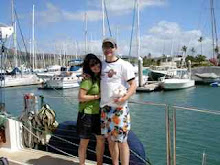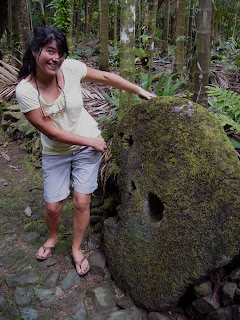Outside of the Pacific, Yap is known primarily for two things: manta rays and stone money. We've spotted manta rays while snorkeling and diving. Stone money requires less equipment to find, and has an interesting history that is entirely unique to Yapese culture.
In its heyday, stone money ("rai" in Yapese) was quarried in Palau and ferried back to Yap on rafts towed by large sailing canoes. Rai varies in size, but size doesn't necessarily correlate with value. Value is instead associated more closely with the difficulties associated with quarrying and transporting each individual stone.
Stones that cost lives to transport are worth more than those that arrived here easily, as are stones quarried with shell and stone tools, before iron and steel were introduced to the islands.
Stones that cost lives to transport are worth more than those that arrived here easily, as are stones quarried with shell and stone tools, before iron and steel were introduced to the islands.
The stone money banking system had advantages and disadvantages. It's not easy to carry rai here and there, so when the money changed hands -- most commonly for land purchases or to settle grievances -- it usually remained where it was.
Although inconvenient, the size of the stones also has the happy consequence of making them very difficult to steal. In our estimation, Yapese stone money banks must be the among the most secure in the world.
Although inconvenient, the size of the stones also has the happy consequence of making them very difficult to steal. In our estimation, Yapese stone money banks must be the among the most secure in the world.
Despite these advantages, a lack of regulation led to Yap's own inflationary troubles during the late 19th century. They began when an enterprising Irishman named David O'Keefe was shipwrecked near Yap and found himself washed ashore in the early 1870s. Observing the prevalence of stone money throughout the islands, he came up with the bright idea of creating a cash economy. Using steamships and modern tools, O'Keefe quarried his own rai and exchanged it for copra, which he then sold to traders in Hong Kong and points west. This influx of stone money soon drove its value down; today, pieces quarried with modern tools and transported by steamer hold far less value than those that were gathered in a more traditional manner.







No comments:
Post a Comment